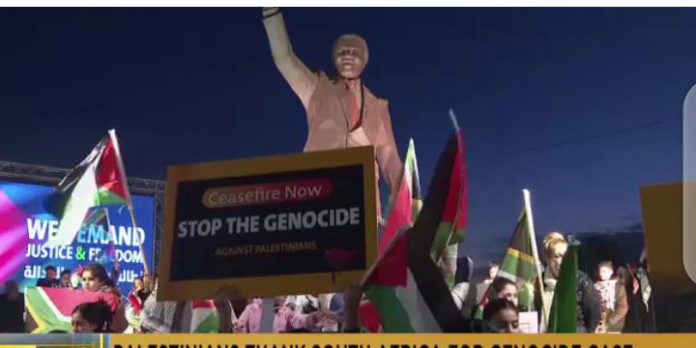Palestinians on Wednesday gathered at the Nelson Mandela Square of Ramallah to thank South African government for filling a case against Israel at the International Court of Justice (ICJ).
Participants at the rally held banners calling for a ceasefire in the Gaza Strip.
Mandela had compared the plight of Palestinians in the Gaza Strip and the West Bank with that of Black South Africans under the apartheid system.
The mayor of Ramallah which is located in the occupied West Bank was full of gratitude.
“Today we say thank you. Thank you to South Africa,” Issa Kassis said.
“Thank you for filing case against occupation at the ICJ. We believe that many countries felt our pain, but South Africa decided to put it materially in paper, on paper and filed a case.”
The case is expected to begin preliminary hearings on Thursday Jan. 11 at the ICJ.
South Africa argues that Israeli acts which are allegedly genocidal in character include the killing of Palestinians in Gaza, causing serious mental and bodily harm, and deliberately inflicting conditions meant to “bring about their physical destruction as a group.”
Five countries including Jordan, Turkey, and Malaysia have so far openly expressed their support for the case, while only Israel and the United States have opposed it.
According to an investigation by +972 Magazine and the Hebrew-language outlet Local Call, which cited several current and former sources in Israel’s intelligence community reported that the Israeli army deliberately target civilian infrastructure.
Israeli government spokesperson Eylon Levy on January 2nd called the accusations “blood libel” and said that Israel would appear before the ICJ in the Hague to dispel the claims.
Levy also said that the case lacked “both a factual and a legal basis”.
Israel’ war in Gaza has killed more than 23,200 Palestinians. About two-thirds of the dead are women and children, health officials say.
In the Oct. 7 attack, Hamas militants stormed through several communities and killed some 1,200 people, mainly civilians.
They abducted around 250 others, nearly half of whom have been released.












